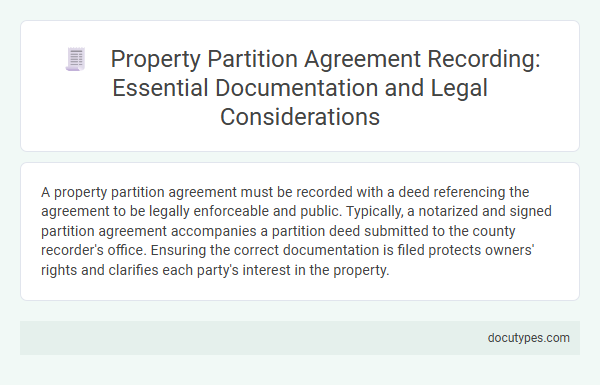A property partition agreement must be recorded with a deed referencing the agreement to be legally enforceable and public. Typically, a notarized and signed partition agreement accompanies a partition deed submitted to the county recorder's office. Ensuring the correct documentation is filed protects owners' rights and clarifies each party's interest in the property.
Introduction to Property Partition Agreements
A Property Partition Agreement divides shared ownership of real estate among co-owners. This legal document outlines how the property will be split, detailing each party's rights and responsibilities. You must submit a properly executed Partition Agreement, typically notarized, along with the deed when recording the partition with the county recorder's office.
Legal Definition and Purpose of Partition Agreements
A Property Partition Agreement is a legal document that outlines the division of jointly owned property among co-owners, specifying each party's share. The purpose of a partition agreement is to provide a clear, enforceable plan for property separation to avoid disputes and facilitate ownership transfer. You need a notarized and properly recorded partition agreement to ensure legal recognition and prevent future conflicts over the property.
Key Components of a Partition Agreement Document
A Partition Agreement is essential for dividing property ownership among co-owners. This legal document outlines the terms and details of property division clearly.
Key components of a Partition Agreement document include the description of the property, the names of all owners involved, and the specific portions each owner will receive. It must specify the methods for partitioning, whether by physical division or sale. Your signature and notarization are often required to validate the recording of the agreement with the local land records office.
Steps for Drafting a Property Partition Agreement
Drafting a property partition agreement requires careful preparation of specific legal documents to ensure accurate recording. Understanding these documents simplifies the process and protects your property rights.
- Title Deed Preparation - The original property title deed must be collected as it serves as the primary proof of ownership.
- Partition Agreement Drafting - A clear, detailed written agreement outlining the division of the property among parties is essential for legal recognition.
- Stamp Duty Payment Receipt - Evidence of paid stamp duty on the partition agreement is required for its validity during registration.
Importance of Recording Partition Agreements
Recording a property partition agreement requires a properly executed and notarized partition deed or agreement. This document serves as formal evidence of the division and ownership changes of the property among the co-owners.
Recording partition agreements is crucial to provide public notice and establish clear legal title to each owner's portion. This process helps prevent future disputes by ensuring the agreement is officially documented in county records.
State-Specific Recording Requirements
State-specific recording requirements determine the documents needed for a property partition agreement. Each state has unique regulations specifying the exact forms and supporting paperwork required for legal recording.
Your property partition agreement must include a notarized deed and the signed partition agreement in most states. Some states may also require affidavits, witness statements, or proof of payment for recording fees to complete the process.
Legal Implications of Not Recording
Recording a property partition agreement involves submitting a legally binding document that clearly outlines the division of shared property interests. Failure to record this agreement can lead to significant legal complications, including disputes over ownership and challenges in enforcing property rights.
- Property Partition Agreement - A detailed, signed document specifying the terms and divisions of the shared property among co-owners.
- Legal Recognition - Recording the agreement with the county recorder's office provides public notice and legal recognition of the partition.
- Consequences of Not Recording - Unrecorded agreements may be deemed invalid against third parties, leading to potential ownership conflicts and difficulties in future property transactions.
Common Challenges and Disputes in Partition Agreements
| Document Required for Recording a Property Partition Agreement | A certified copy of the Partition Deed or Partition Agreement is essential for recording a property partition. This document must be legally drafted, signed by all co-owners, and notarized to ensure validity and acceptance by relevant land registration authorities. |
|---|---|
| Common Challenges in Partition Agreements | Disputes over valuation of the property, unequal distribution of shares, and lack of clarity in boundary definitions frequently complicate property partition agreements. Incomplete documentation and failure to comply with statutory requirements often delay the recording process. |
| Disputes Arising from Partition Agreements | Disagreements over maintenance expenses, disagreements on the mode of partition (sale vs. physical division), and claims of coercion or fraud during agreement execution can lead to legal challenges. Conflicting ownership claims by third parties also pose significant risks. |
| Tips to Avoid Disputes | You should ensure comprehensive drafting of the agreement, include all co-owners in discussions, and obtain proper legal advice. Detailed valuation reports and clear boundary descriptions help minimize conflicts and facilitate smooth recording of the partition agreement. |
Role of Legal Counsel in Partition Documentation
Recording a property partition agreement requires precise legal documentation to ensure the division is legally recognized. Consulting legal counsel plays a crucial role in preparing and reviewing the necessary documents to avoid future disputes.
- Legal Drafting Expertise - Legal counsel ensures the partition agreement is clearly drafted to reflect the intentions of all parties involved.
- Title Verification - Your attorney verifies property titles to confirm ownership and proper division before recording.
- Compliance Assurance - Legal professionals guarantee the partition agreement meets local recording requirements and statutory regulations.
Engaging your legal counsel early streamlines the recording process and safeguards your property rights.
Which Document Is Needed for Recording a Property Partition Agreement? Infographic

